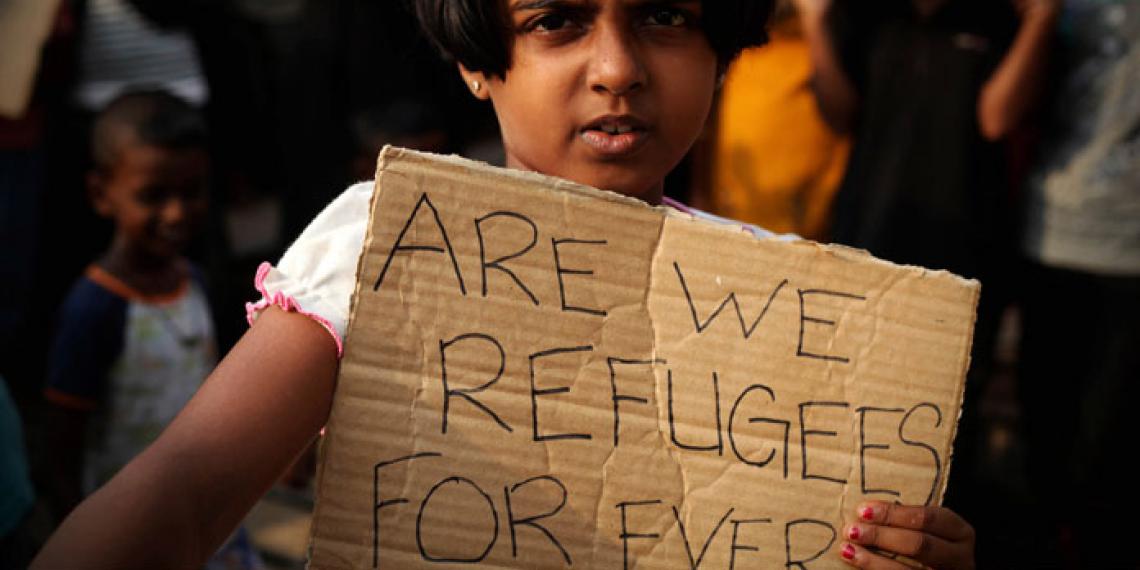You are here
Room for refugees?

Looking at the stories of thousands of refugees and the increasing stories of their misery on the news, it’s easy to feel overwhelmed and helpless. Amidst the noise though, there are signs of things we can do, here in New Zealand, if we have the courage to care.
According to the United Nations High Council for Refugees (UNHCR), there are 19.5 million refugees and asylum seekers worldwide and 40 million stateless and internally displaced people (refugees in their own country). About 180,000 urgently need resettling. About 80,000 a year are resettled.
New Zealand is not a big destination for refugees. In the past five years, we’ve taken in 5104 refugees. In comparison, Malaysia, Thailand and Indonesia together host just under one million refugees and asylum seekers. Australia has 48,700 and takes in 13,750 new refugees a year.
In 1987 we signed an agreement with UNHCR to take 800 refugees a year under a quota system. That number was reduced to 750 a year in 1997 and has remained unchanged since. We regularly don’t fill that quota. We do also take up to 300 family members of refugees already here. In addition, about 300 people a year make their own way here to ask for asylum, which is usually granted for about 100, says Salvation Army Wellington Community Ministries Director Tim O’Donovan. Tim used to be the general manager of Change Makers Refugee Forum.
Successive New Zealand governments have insisted we’re doing our bit—pointing out that, of the 26 countries who take quota refugees we’re among the 10 who take the most. Compare us with the whole world, though, and we’re 97th for the number of refugees we have compared to our population. In fact, it is developing world countries that take in the majority of refugees worldwide (86%) and only a fraction are housed by the developed world.
There’s no simple solution, but we cannot forget these are human beings in a desperate situation. They are our neighbours going through extreme suffering, and for Christians, the Bible is clear—we cannot look away. Then there’s the uncomfortable truth that we contribute to problems like poverty that create and exacerbate the wars and persecution refugees are fleeing. We do this through things like buying unethical clothes, food, drink and electronic gadgets. In the face of that, doing nothing is morally bankrupt. Or, as Tim says, ‘From a humanitarian perspective and a Christian perspective there’s no question about whether we should be supporting these people. My question would be, Are we doing enough?’
As politicians seem to struggle on a slow path to possible solutions it has been inspiring to see the reactions of ordinary people. Earlier this year it was Indonesian fisherman who sailed out and, in defiance of their government, rescued boatloads of Rohingya refugees pushed back out to sea by the navies of other South East Asian countries who did not want the responsibility.
In Europe, as countries put up border fences, a group in Berlin put out an online call and more than 780 Germans came forward offering rooms in their own homes for refugees. Over the past few days 20,000 people took to the streets of Vienna protesting the treatment of refugees, and 12,000 people in Iceland signed an open letter to their government asking to take in more refugees, with many offering rooms and support.
In New Zealand, pressure is growing on our government to do more too, from members of the public, politicians and international human rights groups.
Being physically so far away it can seem hard to take such directly practical options. So, what can we do? For refugees already here there are groups helping them that could do with volunteers, while simple kindness goes a long way. To fight the long-term problem, we need to have the courage to combat problems like poverty and help people to have a life where they don’t need to flee their homes. The good news is Kiwis are pretty generous giving to charities and there are some great initiatives out there we can get behind.
The Salvation Army is acting to help the immediate problem. As part of a wider initiative, its Community Ministries is developing an action plan for how best to respond to people with a refugee background. In Wellington, Community Ministries also works with the Refugee Family Reunification Trust and Catholic Social Services to support newly arrived family members, who don’t qualify for the help the Government provides to refugees to settle here.
Many refugees are highly educated people and, despite some negative stereotypes, most have a lot to contribute to New Zealand, Tim says.
‘The vast majority of people I met were people who wanted to make a contribution and give something back, but you have got to provide the foundations for people to step up. There’s no question in my mind, if we provide those initial support mechanisms, people who come in as refugees will make a positive impact in our communities and society. If you look at people that came in after World War II—Poles, Hungarians, Jews—they have gone on to build something of their lives and their community. We need to be offering recent arrivals the same opportunities.’
by Robin Raymond (c) 'War Cry' magazine 13 June 2015, pp3 (adapted)
You can read 'War Cry' at your nearest Salvation Army church or centre, or subscribe through Salvationist Resources.